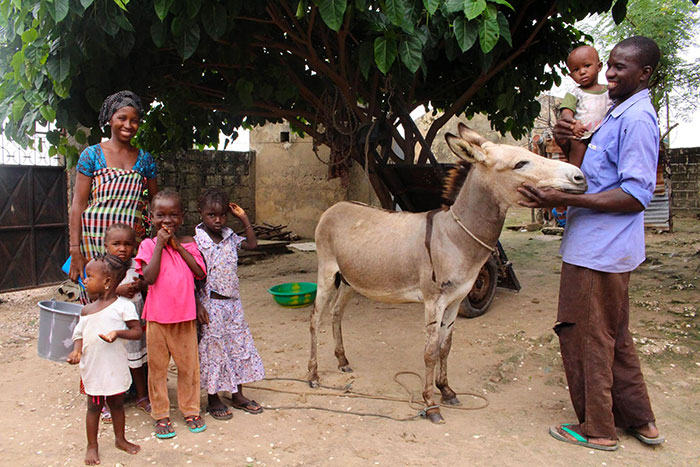Don’t forget the animals powering the developing world
Guest blog by The Brooke
It’s a time for New Year’s resolutions, and in 2015 they’re being made at an international level. It’s less than a year until the deadline for the Millennium Development Goals that were set 15 years ago by the United Nations (UN). They aimed to tackle key issues affecting the world’s poorest people. After 2015, these will be replaced by the Sustainable Development Goals, and in September this year the UN will meet to set out a plan for the next 15 years looking at many issues, including poverty and hunger and improving health and education.
Nothing to do with donkeys, horses and mules, right? Well in fact, over 100 million working equine animals in the world actually provide vital support to people, helping them to make a living and therefore care for their families. The money they earn allows people to buy food and their children to go to school.
Decisions made at an international level have a massive impact for those people who depend on their working animals.
The Brooke sees this first hand in its work and has been working to influence international policy making in this area. To put it into perspective, over 95% of donkeys in the world are kept for work and earn income for their owners and their families, and yet, right now, although policy makers are starting to consider the role of livestock in food security, it’s only animals that produce food or fibre that get counted – horses, donkeys and mules are not considered as important. However, from stories and information gathered in the field, the Brooke knows that they are essential.
Diarra’s story:

There are roughly 14 million people living in Senegal, and it is estimated that around 54% of this population lives below the poverty line. Diarra lives in our new project area Sokone, 224km from the capital Dakar in Senegal. Diarra is a hardworking housewife currently nursing her new baby, Sally. She’s very appreciative of the contributions their only donkey is making to the household:
“The donkey is very useful for my family. He works at the farm, carries wood, goes to the market. Even when I was about to deliver my baby Sally, this donkey took me to the hospital. He is very useful to us.”
Diarra’s brother in-law also uses the donkey to collect rubbish in the neighbourhood twice a week, in contribution to the household income. He is one of the equine owners currently benefiting from the Brooke’s training. He is now aware of the importance of proper handling and care and views the donkey as part of the family.
In 2015, a year when people are seriously thinking about the future, the Brooke is stepping up its advocacy work. Our teams are joining more global policy debates to show the role that working horses, donkeys and mules play, and linking with other organisations. For example, the Brooke is already working with the Food and Agriculture Organisation of the UN (FAO) and later this year will be releasing a new report on the contributions of working equine animals to people’s livelihoods.
As well as working at a national and international level, the Brooke also works on the ground directly to help owners and communities improve their animals’ welfare. We have found that people’s access to food often depends on whether their animal can work, so if a horse, donkey or mule dies, the impact can be devastating. This is just one of the reasons why their welfare is important.
International charities are using advocacy to improve people’s access to food or water, eradicate diseases, or get their children into school. The Brooke is speaking up for the needs of the working equine animals that are helping people each day to earn a living.
The Brooke needs your help to spread the word. Share this blog, and join our social movement on Facebook, Twitter or Instagram – make your new year’s resolution to share this message, and support our work through 2015. If we can reach more people and get them to notice the working equines powering the developing world, we will be able to improve their lives, and in turn, the people who depend on them.



Yes animals do empower the world! They were first. As we study the ways of most species,we have found out,by sheer research,they are trying to tell us something.Don’t people realize, to them there are no labels just a will to survive. My thoughts are to do what they are doing…preparing. Avian species are migrating to figure out where they can find more land,food,etc.All of us,no matter what race, beliefs,or political views we have,are all to blame for the repercussions of climate change.We need a course of action take care of us the world and anything left! We always have to start with us first. If we can’t agree how can we go on? Disagreements lead to tensions which leads to hatred and war. Whether a capitalist,socialist, etc its just a label.These labels need to be in the back of our mind as it is our right and freedom to believe in what we want, but come on people we need tojoin together now for the common good of man. It’s time to act like the birds…and survive and save this world!Thanks, Marielisa
Comment by Yes animals do empower on 01/02/2015 at 2:58 pm